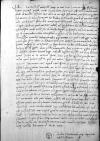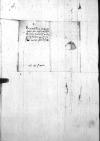Letter #580
Karel UUTENHOVE to Ioannes DANTISCUSGhent (Gandavum), 1532-01-19
English register:
Uutenhove was delighted by Dantiscus’ most kindly and at the same time festive letter. The tone of the letter suggests that the party itself was still more festive.
If Robbius’ stories are to be believed, it would be better if his wife does not find out. She will surely treat him to a shouting match and a good thrashing; Uutenhove would like to see his reaction.
Dantiscus should know that Robbius is constantly bragging about the many cups he has emptied and the delicious mouthfuls he has devoured, and is showing Dantiscus' gift around. Recently they also celebrated Dionysia, where Robbius behaved more comically than any poet or painter could depict.
There is no further news except that everyone there is doing well and remembers Dantiscus. He is extremely grateful that Dantiscus has offered him every possible support. Uutenhove will never be able to render any service to equal Dantiscus' immense benevolence. This letter has been handed to Dantiscus by a relative, Frans Uutenhove, who wants to be recommended to Dantiscus and would like to accompany Dantiscus to Poland as a member of his household. He may be rather impetuous but he is refined and faithful, so Uutenhove dares to recommend him. If Dantiscus should decide, when in Poland, that he is of no use to him, he would do Uutenhove a favour by finding him a good employer.
Willem De Waele, Lord secretary [Omaar van Edingen] and Uutenhove’s sister Iodoca recommend themselves to Dantiscus. Uutenhove asks to be recommended to Dantiscus' acquaintances to whom he is known. He bids Dantiscus farewell, as a contemporary Maecenas, and closes his letter with festive greetings.
Manuscript sources:
Auxiliary sources:
Prints:
| ||||||||||||
Text & apparatus & commentaryPlain textText & commentaryText & apparatus
Reverendo in Christo Patri, domino
Ubi, ubi fuerit.
Salutem plurimam.
Incredibilem voluptatem accepi ex tuis tam humanis tamque festivis cf.
Quod scribis, ut te certiorem facerem de his, quae hic aguntur, prorsus non video, quid scribere possim, quam nos valere, suaviter vivere ac tui haud quaquam immemores esse. Quod tuum officium ac, quacumque in re possis, auxilium offers, habeo gratias immortales nec video, quid umquam dignum tam immodica tua erga me benevolentia praestare possim. Hoc quod autem, quod vel imprimis tibi gratum fore arbitror, faciam, te dum vivam amabo, colam, venerabor.
Qui has ad te fert, est mihi sanguinitate coniunctus,
Vale.
Dominus
Rursus vale


 BCz, 247, p. 96
BCz, 247, p. 96